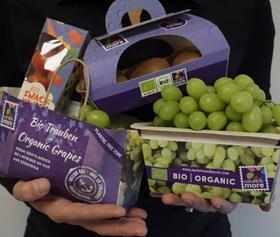
Dutch organic fruit and vegetables specialist Eosta is continuing its stand against unnecessary single-use plastic packaging with the launch of a “Plastic-Free Zone” at next month’s trade fairs, Fruit Logistica in Berlin and BioFach in Nuremberg.
The Plastic-Free Zones will showcase the myriad alternatives to plastic packaging, and Eosta’s packaging and sustainability experts will be available to share their knowledge and answer visitors’ questions.
Alternatives to plastic include sugar cane waste material, carton trays and cellulose nets. Meanwhile, Natural Branding has enabled Eosta to save over 10m packaging units to date, the company revealed, and has motivated other fruit and vegetables suppliers to do likewise.
One of Eosta’s biggest contributors to saving plastic is its organic ginger, sold without any plastic packaging thanks to the use of Natural Branding. “By branding and therefore differentiating the organic ginger instead of packing it, the company has saved more than 40,000 kg of plastic foil in a year,” the company revealed.
Packaging manager Paul Hendriks, who is responsible for such innovations, commented: “The most sustainable packaging is no packaging. However, if you are going to pack, there are many great, much more sustainable alternatives for plastic like carton, cellulose netting and agri-waste material.”
Michaël Wilde, Eosta’s sustainability manager, stressed the urgency of the matter. “In 2018, it became crystal clear that concerned consumers have had it with unnecessary single-use plastic packaging,” he said. “They are shocked and saddened when we see yet another picture of a polluted beach, floating plastic soup or sea animals, fish and birds that get caught up in our plastic waste. At the same time they go into a supermarket and are confronted with a ‘sea of plastic’ and ask themselves, ‘Why is this necessary?’ We are helping our retail customers to become part of the solution instead of the problem.”



